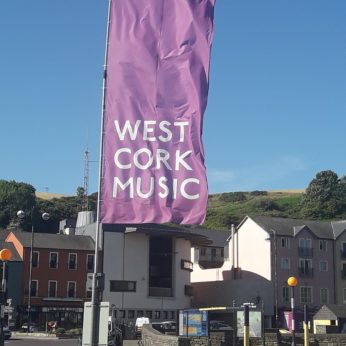Composer: Sergei Prokofiev (b. 1891 - d. 1953)
Performance date: 26/06/2010
Venue: St. Brendan’s Church
Composition Year: 1949
Duration: 00:25:28
Recording Engineer: Anton Timoney, RTÉ lyric fm
Instrumentation: pf
Instrumentation Category:Duo
Artists:
Leonard Elschenbroich -
[cello]
Alexei Grynyuk -
[piano]

The
new opera of Prokofiev shows serious defects from the ideological and
artistic point of view. Prokofiev’s music is in direct
contradiction to the text and the dramatic action. The Soviet
spectator is outraged to see the pilot, a hero of the war, depicted
as a gross marionette. Almost the entire opera is constructed on an
unmelodious musical declamation and the few songs introduced by the
author cannot save the situation. Tikhon
Khrennikov, Central Committee denunciation of Prokofiev 21 December
1948.
This
was the kind of deadly nonsense that composers like Prokofiev,
Shostakovich and Myaskovsky would have had to deal with along with
attending the suffocatingly boring but equally deadly meetings of the
Central Committee where lesser composers and stupid musical
bureaucrats would fall over themselves to denounce their music in
public. The end result of these so-called Zhdanov purges was that the
three composers – and many others – were stripped of their
teaching posts and had performances of their works banned. Prokofiev
ultimately regained favour through writing a Soviet-style cantata, On
Guard for Peace and
a children’s Suite, Winter
Bonfire. In
the meantime he was persuaded by Slava Rostropovich to write him a
Cello Sonata.
Rostropovich
is said to have premiered 117 new works. He
had works written for him not only by Prokofiev and Shostakovich, but
also by other leading composers such as Schnittke, Gubaidulina,
Khachaturian, Penderecki, Lutoslawski, Britten, Dutilleux, Messiaen,
Bernstein and Piazzolla. He was barely twenty when he first met
Prokofiev after he performed his neglected Cello Concerto. The
composer was inspired to write his Cello Sonata after he heard
Rostropovich play Myaskovsky’s second Cello Sonata. Rostropovich
then recruited Sviatoslav Richter to be his pianist, a dream team it
would be hard to match.
In
his memoirs Richter notes We
gave the first performance of Prokofiev’s Cello Sonata. Before
playing it in concert, we had to perform it at the Composer’s Union,
where these gentlemen decided the fate of all new works. During this
period more than any other, they needed to work out whether Prokofiev
had produced a new masterpiece or, conversely, a piece that was
‘hostile to the spirit of the people.’ Three monthes later, we had to
play it again at a plenary session of all the composers who sat on
the Radio Committee, and it wasn’t until the following year that we
were able to perform it in public, in the Small Hall of the Moscow
Conservatory on March 1, 1950.
By
this time, four years before his death, far from well and battered by
the strain of surviving under Soviet conditions, Prokofiev’s music
no longer had that acerbic provocative edge, instead his lyricism is
here coupled with a warm sense of humour, unrivalled melodic
invention and brilliant virtuosity. The endless succession of
colourful new melodies can seem like a glorious fairy-tale with
gallant dance tunes, the occasional glimpse of darkness, several
love-songs and much witty repartee.
Copyright © 2024 West Cork Music. All rights reserved.
Designed and developed by Matrix Internet